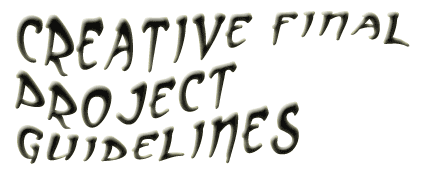

Students enrolled in RLST 128F whose main course of study is in the Fine Arts (or who are just interested in the arts) may opt to substitute an original creative work of "biblical fiction" for the analytic paper assignment of the final project. A creative work should only be undertaken by someone with experience in producing creative works of art, given the deadlines and limited time period of the course (i.e., there is not time for a student to learn how to write a screenplay in addition to writing a screenplay).
Such a creative work should choose a biblical "source" text from which to produce a "fiction" along the lines of the various biblical fictions analyzed in class. Narrative fictions (stories, plays, and so forth) are preferred, although other media (music, plastic arts, visual arts) will be considered.
All creative final projects must be cleared with the professor before being undertaken. If you think you would like to pursue a creative final project, please make an appointment to meet with the professor as soon as possible.
On the day of your in-class presentation, you may give a brief overview of your creative final project to your classmates; the content of your presentation should be similar to those of the other in-class presentations; that is, you should address the relationship between the biblical "source text" and your creative biblical fiction.
For your final project, in addition to your creative work, you must also turn in an brief retrospective analysis of your own work, detailing for the professor:
1. The inspiration for the project (why you chose to work with this source text and in this artistic medium and with this result);
2. The imagined audience for this project;
3. The relationship between the biblical source text and the final biblical fiction.
Your brief retrospective analysis should be around five pages long (double-spaced, in a reasonably-sized font such as 12-point Times New Roman, with no more than 1.25" margins all around, pages numbered).